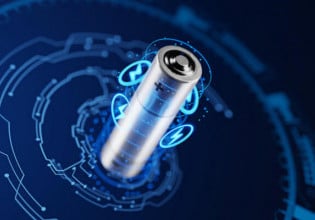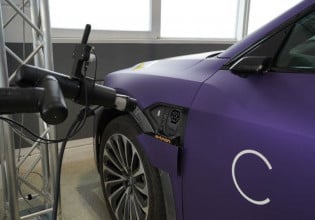Factorial Energy Clears United Nations Safety Certification to Transport EV Batteries
Factorial Energy secures a United Nations safety certification to ship its large-format solid-state batteries for electric vehicles.
Massachusetts-based Factorial Energy, a developer of solid-state batteries for electric vehicles, recently announced a new milestone for its large format battery cells, landing the 38.3 safety certification from the United Nations. The approval secures the company’s position as the first lithium-metal solid-state battery manufacturer to receive clearance for 100 Amp-hour (Ah) cells.
Factorial Energy’s 100 Amp-hour electric vehicle battery cells. Image used courtesy of Factorial Energy
Factorial unveiled its first 100 Ah batteries at CES earlier this year, scaling up from a 40 Ah capacity previously. Part of a joint development deal with Netherlands-based auto giant Stellantis, the company showcased the latest iteration’s capabilities to meet the demand for higher-density batteries enabling longer driving range.
The UN certification boosts the product’s safety selling point after Factorial demonstrated its high performance at 100 Ah. The UN 38.3 standard is mandated globally for transporting lithium-ion and lithium-metal batteries by air, sea, and land. Third-party organizations conduct tough safety tests to evaluate the battery’s durability through various hazards, including vibrations, crushing, thermal exposure, shocks and short circuits, high and low altitudes, and forced discharge.
In a statement, Factorial Energy CEO Siyu Huang called the certification a significant accomplishment, signaling the company is on track to build safer, high-energy-density batteries. The clearance also brings it closer to securing automotive qualification, its next step towards wider commercialization. With the UN certification, the company can ship its 100 Ah cells to customers worldwide.
The company claims its Factorial Electrolyte System Technology (FEST) provides up to 50% higher energy density than competing lithium-ion batteries, the prevailing industry standard in the EV market.
Factorial Scales Battery to 100 Ah
Unlike their lithium-ion counterparts, solid-state batteries use a solid material instead of a liquid electrolyte. Their non-flammable makeup adds another benefit over fire hazard-prone lithium batteries. As major automakers transition from traditional internal combustion engines to electrified vehicles, they demand safer battery components that can be packed into tighter spaces, which translates to lightweight vehicle models capable of traveling longer distances between charging sessions.
Factorial Energy is one of several companies in this market, but it’s the first to receive UN clearance for safe transport. Other players include Colorado-based Solid Power and California-based QuantumScape, which have received backing from major brands such as BMW, Ford, and Volkswagen.
The timing of Factorial Energy’s market entrance gives it an edge, debuting the industry’s first 40 Ah solid-state battery in 2021. After over a year of improving the design, the company unveiled its first 100 Ah battery cell at CES 2023 in January, part of its joint development partnership with Stellantis. The next-generation edition marked a significant step up from its previous capacity as the company created larger format cells to meet the performance needs of global original equipment manufacturers.
Stellantis CEO Carlos Tavares mentioned in his CES keynote that Factorial’s solid-state battery could deliver up to 30% higher density compared to lithium technology, adding that the two companies were working on pushing this level to 50%. In its latest announcement on the UN certification, Factorial stated its FEST platform uses a solid electrolyte material to provide up to 50% higher density.
In a keynote at CES 2023, Stellantis CEO Carlos Tavares covered Factorial’s solid-state batteries, capable of meeting the demand for higher energy density over standard lithium-ion batteries. Image used courtesy of Stellantis
Factorial’s Expansion
Factorial had already been making waves in the industry for developing 40 Ah capacity cells. Now scaled in 100 Ah and operable at room temperature, the product is compatible with existing lithium-ion battery manufacturing equipment—another critical selling point in its target market. The company has inked joint development agreements with Hyundai/Kia, Mercedes-Benz, and Stellantis, with the latter two firms leading its $200 million Series D funding round in January 2022. According to Crunchbase, it has raised $240 million to date.
Factorial is expanding globally, recently establishing a subsidiary in Germany to build out its European presence and work closely with its suppliers and manufacturing partners across the region. And in 2022, the company broadened its reach to the Asian market, launching operations in Japan and opening a new office in South Korea.
Factorial is also ramping up its manufacturing capacity, announcing last year it would invest $45 million to build an advanced manufacturing facility to produce its battery cells near Boston.








